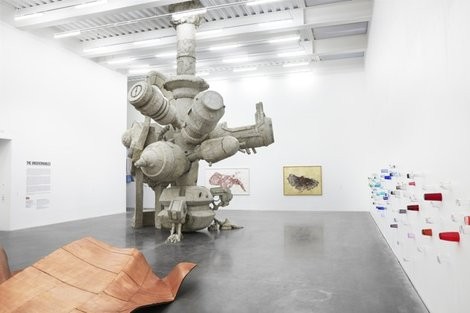"Against Monuments"
Publicado21 Mar 2012

As an exhibition, the New Museum Triennial is still so young that it seems almost premature to call it a New York institution. Yet in just its second iteration, “The Ungovernables,” which runs through April 22, the show has already established the very thing that even veteran surveys of contemporary art would envy: a clear identity, and one that doesn’t seem redundant with either the concurrently running Whitney Biennial –the sprawling, uptown event whose intense emphasis this year on time-based media such as film, music, and performance makes it the antithesis of the compact New Museum exhibition—or the various other museum-sponsored roundups like PS 1/MoMA’s “Greater New York.” Focusing especially on work made by very young artists––the first Triennial went by the asinine name of “Younger than Jesus”––many of whom are based outside the US and Europe, the exhibition brings a surprisingly underrepresented perspective on recent art, no easy achievement in a city with a gamut of commercial galleries and museums. The current show also tries to make a case for reading the work on view amid the political upheaval and messy, unfinished pursuit of democracy that has marked much of the developing world, but the artists don’t fit into this frame as snugly as the curators want to suggest.
The exhibition includes work by thirty-four artists or collectives, few of whom have previously been seen in New York. A large majority hail from countries other than the United States, with a preponderance of Latin American, Middle Eastern, and Asian artists. Curator Eungie Joo has emphasized the fact that many come from countries whose post-1970s existence—a span during which most of these artists were born—was marked by economic and political uncertainty: they were ungovernable in the pejorative, failed-state sense. But she also wants to underline the creative resistance and flexibility of young artists, in which she hears spiritual echoes of the ANC’s embrace of “ungovernability” as a political strategy against apartheid (the term was coined with the Soweto riots and the call to make South Africa positively ungovernable). In the catalog accompanying the show, Joo links the idea to continuing democracy movements across the globe, from the Arab Spring to the Occupy demonstrations.
Continuar a ler na The New York Review of Books.
